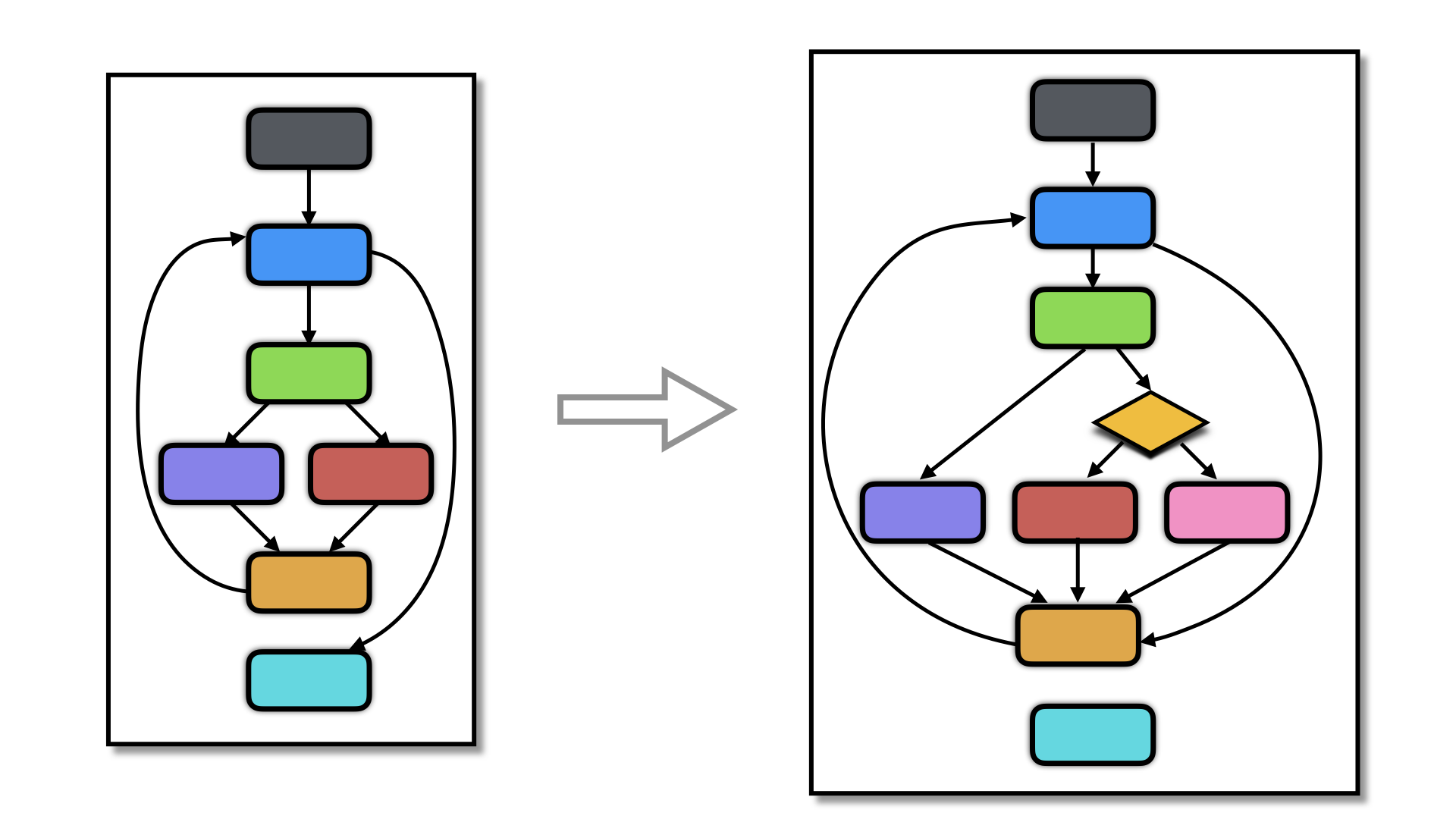

Break up code blocks by inserting opaque predicates. Requires that at least the InitOpaque transform has been previously issued and, preferably, that one or more UpdateOpaque transformations have been given.
Here's a LigerLabs video that discusses this transformation:
| Option | Arguments | Description |
|---|---|---|
| --Transform | AddOpaque | Add opaque predicates to split up control-flow. |
| --AddOpaqueCount | INTSPEC | How many opaques to add to each function. Default=1. |
| --AddOpaqueKinds | call, bug, true, junk, fake, question, * | Comma-separated list of the types of insertions of bogus computation allowed. Default=call,bug,true,junk,question.
|
| --AddOpaqueObfuscate | BOOL | Perform some light obfuscation of copied code when using the 'question' opaque predicate. Default=true. |
| --AddOpaqueSplitBasicBlocks | BOOL | Split up basic blocks (sequences of statements without control flow) so that opaque predicates can be inserted between them. Default=false. |
| --AddOpaqueInline | BOOL | Inline the split out functions when using 'question' opaque predicates. Default=false. |
| --AddOpaqueSplitKinds | top, block, deep, recursive, level, inside | Comma-separated list specifying the order in which different split methods are attempted when --AddOpaqueKinds=question is specified. Default=top,block,deep,recursive.
|
| --AddOpaqueSplitLevel | INTSPEC | Levels which could be split out when specifying --AddOpaqueSplitKinds=level Default=1. |
| --AddOpaqueStructs | list, array, input, env, * | Default=list,array.
|
There are two sources of diversity:
This is the code generated for the arguments options to --AddOpaqueKinds:
call:
if expr=false then
call to random existing function
fake:
if expr=false then
call to non-existing function
true:
if expr=true then
existing statement
bug:
if expr=true then
existing statement
else
buggified version of the statement
question:
if expr=true || false then
existing statement
else
obfuscated version of the statement
junk:
if expr=false then
asm(".byte RandomBytes")
Consider the following script:
tigress --Seed=0 \
--Inputs="+1:int:42,-1:length:1?10" \
--Transform=InitImplicitFlow \
--Transform=InitEntropy \
--Transform=InitOpaque \
--Functions=main \
--InitOpaqueCount=2 \
--InitOpaqueStructs=list,array,input,env \
--Transform=AddOpaque \
--Functions=obf3 \
--AddOpaqueKinds=question \
--AddOpaqueSplitKinds=inside \
--AddOpaqueCount=10 \
arith.c --out=arith_out.c
The result will look something like this:
{
strcmp_result5 = (int )strlen(*(_4_main__argv + (_4_main__argc - 1)));
}
if (x >= strcmp_result5 + y) {
{
}
if (_2entropy * 3 >= _4_main__opaque_list1_1->data) {
{
atoi_result10 = atoi(*(_4_main__argv + 1));
}
if (y >= atoi_result10 + x) {
{
}
if (_4_main__opaque_array_0[(atoi_result10 & 2147483647) % 30] >= 22) {
{
}
if (_4_main__opaque_list2_2->data <= (_2entropy | 6) + (_2entropy & 6)) {
{
strcmp_result15 = (int )strlen(*(_4_main__argv + (_4_main__argc - 1)));
}
if (x >= strcmp_result15 + y) {
{
atoi_result17 = atoi(*(_4_main__argv + 1));
}
if (y >= atoi_result17 + y) {
{
atoi_result19 = atoi(*(_4_main__argv + 1));
}
if (y >= atoi_result19 + y) {
{
strcmp_result21 = (int )strlen(*(_4_main__argv + (_4_main__argc - 1)));
}
if (y >= strcmp_result21 + atoi_result10) {
{
strcmp_result23 = (int )strlen(*(_4_main__argv + (_4_main__argc - 1)));
if (y <= strcmp_result23 + x) {
QUESTION_10_1(& z);
} else {
QUESTION_10_1_COPY(atoi_result24, & z);
}
}
} else {
{
QUESTION_9_1_COPY(& z, 6.);
}
}
{
}
} else {
{
QUESTION_8_1_COPY(& z, 1L);
}
}
{
}
} else {
{
QUESTION_7_1_COPY(& z, z);
}
}
{
}
} else {
{
QUESTION_6_1_COPY(0, & z);
}
}
{
}
} else {
{
QUESTION_5_1_COPY(& z, 0);
}
}
{
}
} else {
{
QUESTION_4_1_COPY(0, & z);
}
}
{
}
} else {
{
QUESTION_3_1_COPY(& z, 0.);
}
}
{
}
} else {
{
QUESTION_2_1_COPY(4L, & z);
}
}
{
}
} else {
{
QUESTION_1_1_COPY(6L, & z);
}
}
{
}
}
}
Notice that we attempt (and sometimes fail) to select opaque predicates
expr1<=expr2 such that
expri are independent of each other (i.e.
analyzing a function should require you to break all the predicates
in it);
expri depend on input (either because they
are created from an entropy source or from invariants over the command
line arguments); and
expr1 and expr2 are computed
from different sources.
For the question-mark predicate we use the function splitter. You should
experiment with different splitting methods to get the effect that you
want, by setting --AddOpaqueSplitKinds=... and
--AddOpaqueSplitLevel=.... --AddOpaqueObfuscate=true does
some light obfuscation to the code in one of the branches; you can, of course,
obfuscate the split out functions yourself.
--AddOpaqueKinds=fake will result in undefined symbols being generated. You need to
coerce the linker to ignore such errors. With gcc you can use this option:
-Wl,--unresolved-symbols=ignore-in-object-files
No similar option seems to exist for clang.
The --AddOpaqueKinds=question adds the code in outlined functions, for reasons I really
can't remember at the moment. It should probably be fixed, but in the mean time you can just
inline the calls:
--Transform=AddOpaque \
--Functions=... \
--AddOpaqueKinds=question \
--Transform=Inline \
--Functions=/.*QUESTION.*/ \